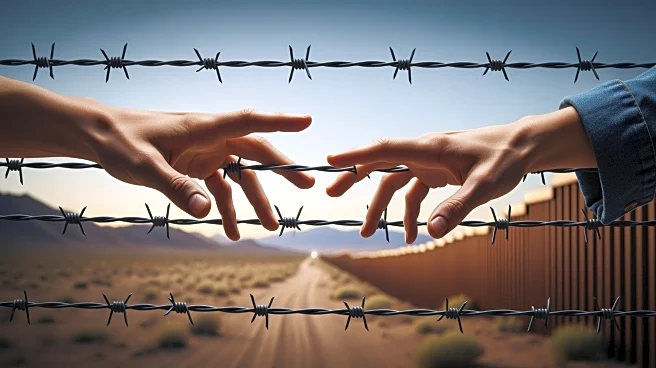What's Happening?
Israel's military aid agency announced ongoing preparations with Egypt to open the Rafah border crossing with Gaza for the movement of people. The crossing is expected to open on Sunday, according to a European
diplomatic source. While the Israeli Defense Forces (IDF) will not be present at the crossing, traffic will be under Israeli supervision. The opening is part of an agreement between Israel and Egypt, with the World Health Organization set to evacuate sick and wounded individuals through the crossing. Humanitarian aid will continue to enter Gaza via other crossings, as the Rafah crossing is not designated for aid transfer. The European Union Border Assistance Mission (EUBAM) has been deployed to train Palestinian forces at the crossing, which will be manned by Palestinian Authority personnel.
Why It's Important?
The opening of the Rafah border crossing is significant as it facilitates the movement of people between Gaza and Egypt, potentially easing humanitarian conditions in the region. The crossing's operation under Israeli supervision reflects ongoing security concerns and geopolitical dynamics involving Israel, Egypt, and the Palestinian Authority. The involvement of EUBAM and the Palestinian Authority indicates efforts to establish a neutral monitoring presence and build trust among parties. This development may impact the political landscape in Gaza, where Hamas has historically controlled border operations, and could influence future negotiations and peace efforts in the region.
What's Next?
The opening of the Rafah crossing is expected to proceed once preparations are complete, with the Palestinian Authority managing operations on the Gaza side. The situation remains fluid, with potential changes in control and management of Gaza's borders. The international community, including the European Union, will likely continue to monitor developments closely. The crossing's operation could lead to further diplomatic engagements and discussions on the broader Israeli-Palestinian conflict, particularly regarding humanitarian access and security arrangements.
Beyond the Headlines
The reopening of the Rafah crossing highlights the complex interplay of humanitarian needs and political realities in Gaza. The involvement of international organizations like EUBAM underscores the importance of third-party monitoring in conflict zones. The situation raises questions about the long-term governance of Gaza and the role of the Palestinian Authority versus Hamas. Additionally, the crossing's operation may influence regional stability and international relations, particularly between Israel, Egypt, and the Palestinian territories.









